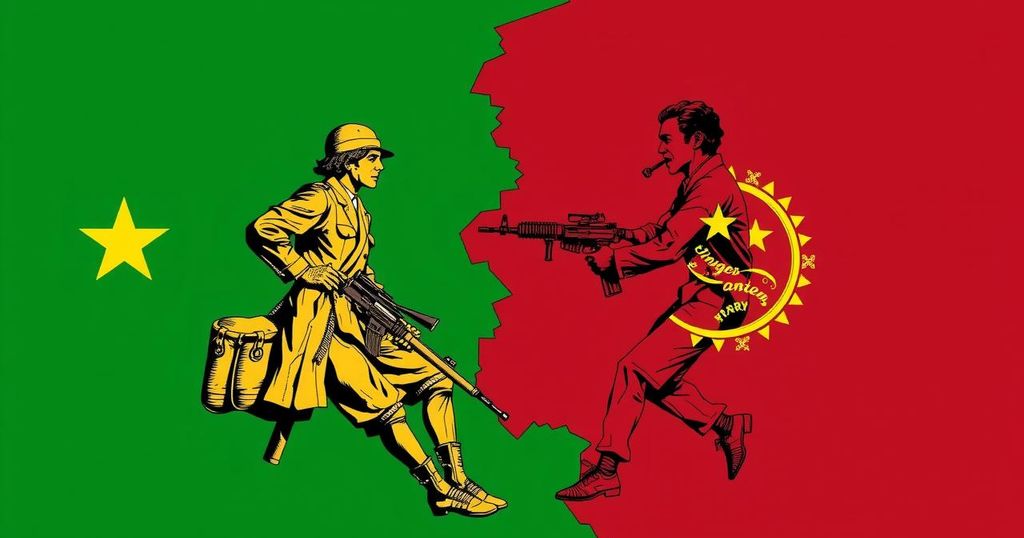The Angolan government is expressing alarm over renewed fighting in the eastern DRC, particularly in Walikale, where M23 rebels clashed with the Congolese army. The violence comes at a time when Angola was advocating for a longer-term ceasefire after a month-long lull in fighting. Angola criticizes these actions as violations of prior peace agreements and urges all parties to respect the ceasefire. Local officials report that the Congolese army has regained control of Kalembe amid clashes, as humanitarian concerns deepen with increasing civilian displacement.
Renewed hostilities in the eastern regions of the Democratic Republic of Congo (DRC) have raised alarms in the Angolan government, particularly as Luanda was advocating for a more enduring ceasefire following a brief intermission in violence. Reports indicate that significant clashes occurred on Monday in the town of Kalembe, North Kivu Province, where M23 rebel forces engaged the Congolese army (Fardc). This outbreak of violence was noted to have followed M23’s recent seizure of the town, which was then recaptured by the Fardc just a day later. The Angolan government issued a press statement condemning this resurgence of conflict, interpreting it as a blatant violation of prior agreements reached during a ministerial meeting held on July 30, 2024. The ceasefire, which came into effect on August 4, was meant to sustain peace and enable displaced individuals to return to their homes safely. Angola has taken on the role of mediator between the DRC and Rwanda, with both nations accusing one another of inciting instability through rebel factions. Their most recent diplomatic assembly took place in Luanda two weeks prior. The DRC promised to curb support for the FDLR rebels, who are viewed as adversaries by Rwanda, conditional upon Rwanda ceasing its backing of the M23 rebels. In response to the ongoing violence, Angola has denounced these actions as undermining the pursuit of a stable resolution to the ongoing conflict in eastern DRC. Angola urged all involved parties to honor the ceasefire, highlighting the need for respect for the commitments made during the recent ministerial discussions. Local sources also detailed that the Wazalendo self-defence group, which aligns with the Congolese military, was involved in the fighting against M23 forces. Political representatives, such as former MP Juvenal Munubo, noted the success of the Congolese army in reclaiming Kalembe, while MP Willy Mishiki expressed concerns that the rebels are attempting to expand their territorial control into three additional provinces—South Kivu, Tshopo, and Maniema. Despite the return of some displaced individuals since the ceasefire began in August, the DRC government has ruled out any negotiations with the M23. Simultaneously, ongoing discussions are being held between the DRC and Rwanda regarding security challenges and a proposed peace agreement. To facilitate better peace monitoring, an ad hoc verification mechanism is being established, with plans for its inauguration in Goma by November 5, 2024. Recent clashes incurred casualties, with over 14 civilians reported injured and many others forced to evacuate their homes. The United Nations projects that nearly seven million individuals will be displaced by the war by 2024, further compounding the humanitarian crisis that has led to severe violations of human rights, including sexual violence, facing civilians in the region.
The Democratic Republic of Congo has been embroiled in conflict for decades, with militia groups vying for control and creating instability across various regions. The DRC’s North Kivu Province has been particularly affected by violence and armed confrontations, notably involving the M23 rebel group, which emerged amid accusations of foreign support and internal contested governance. The Angolan government has actively engaged in mediating discussions to broker peace between the DRC and its neighboring Rwanda, both of which have a history of mutual accusations regarding backing rebel factions domestically. Despite some recent calm following an agreed ceasefire, new skirmishes detract from these peace efforts and evoke concern from international and regional stakeholders.
The resurgence of violence in Kalembe, DRC, poses significant challenges to ongoing peace efforts endorsed by Angola, which condemns the recent hostilities as a serious infringement upon the established ceasefire. The situation remains precarious as the DRC government maintains a hardline stance against dialogue with the M23, while simultaneously engaging with Rwanda to address mutual security concerns. With potential displacement exceeding seven million individuals expected in 2024, the humanitarian crises resulting from the conflict continue to escalate.
Original Source: www.ghanaweb.com






